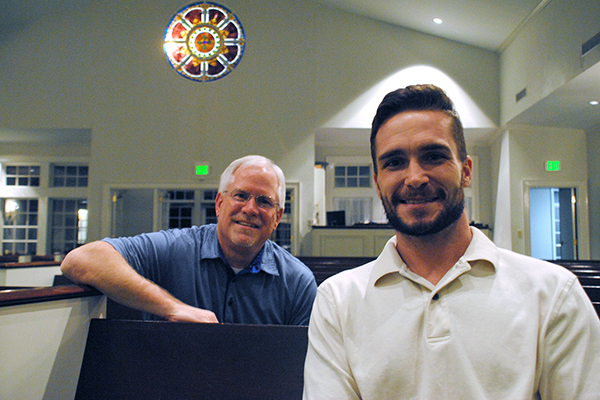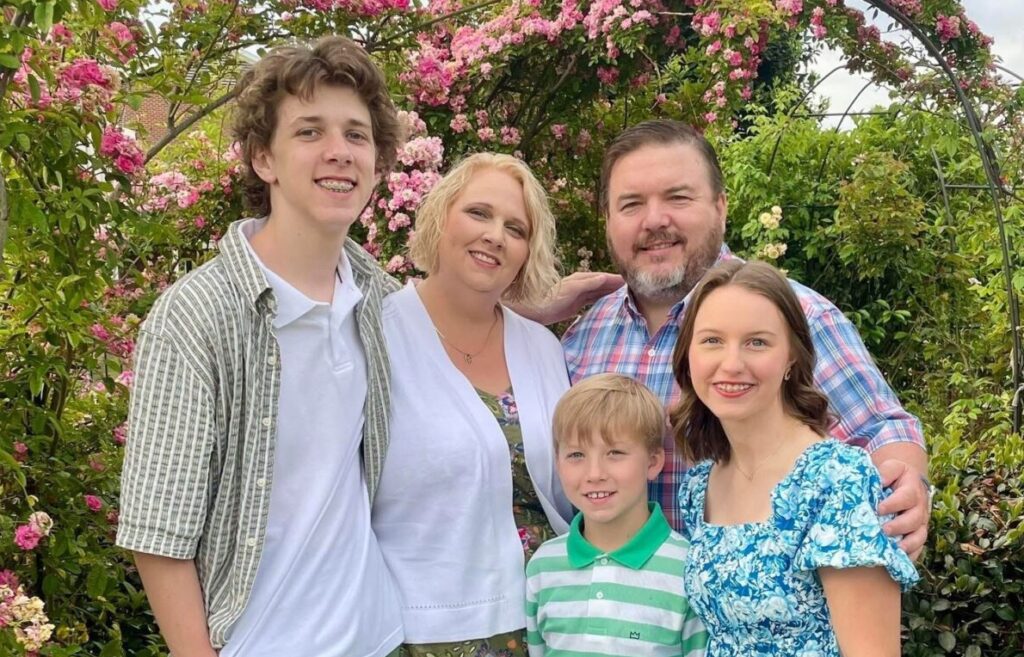Editor’s Note — This article originally ran Aug. 17, 2017, but recently received a third place award in feature article, more than 1,500 words category of Baptist Communicators Association’s 54th Wilmer C. Fields Awards Competition. We are reposting it as part of the featured award-winning articles produced by TAB in 2017.
By Grace Thornton
The Alabama Baptist
Ben Moseley is a little older, the creases in his face a little deeper since he and two of his buddies set fire to some Baptist churches on a night of binge drinking 11 years ago.
He watched 10 birthdays pass while he was behind bars. He woke up every morning of his 20s shaking off the emotions of dreams where everything was normal — life before the day he flicked that lighter. The things he’d done, the things he’d lost and the things he’d taken from others were always in the back of his mind.
“I was told that my life was over, that I had no hope, no dreams or ambitions,” he said. “My slow death had begun.”
And from the outside looking in, that might’ve looked pretty true.
Spinning out of control
Moseley was a freshman at Birmingham-Southern College majoring in music and theater the night that police rushed into his dorm room and ended his youth with some very adult consequences.
“Music was my dream,” he said. “I loved it.”
He loved it even though he was staring down the barrel of two tap classes and two ballet classes that were future course requirements.
“My friends would’ve definitely given me a hard time when I took those classes,” he said with a laugh. “But I never got there.”
Where he got instead was a long way down a country road in Bibb County in the early morning hours of Feb. 3, 2006, drunk and spotlighting deer with two friends.
“It was at the end of our winter term at school and we had free time on our hands,” Moseley said. “We were hunting, ran out of bullets and were just looking for the next thing to do.”
That next thing, he said, was stupid and thoughtless and haunted him for every single day of the nine years, two months and two weeks he sat in prison. He and his friends set fire to five churches — Rehobeth Baptist Church, Lawley; Ashby Baptist Church, Brierfield; and Pleasant Sabine Baptist Church, Centreville, which were all destroyed; and Antioch Baptist Church, Centreville, and Old Union Baptist Church, Randolph, which suffered damage.
A few days later, when the reality of what they’d done set in, Moseley and one of his friends set fire to four more churches in west Alabama in “an exceedingly foolish double dare.”
Things had spun out of control. Officials traced tire tracks at the churches back to the SUV they were driving, and the next thing Moseley knew, police officers were in his dorm room.
“What we did was horrible. It’s always in the back of my mind,” Moseley said. “We had no hatred at all in what we did — it was thoughtless and stupid. And I always had the questions in my mind — how many people were victimized?
How would I feel if I were in their place, or if someone else had come through town and done something like that on a whim? I was in and out in a night, and I never saw the aftermath. I never saw the people I’d hurt.”
But Jeff Greer — he did. He saw those people.
Greer, who was on staff at Mountain Brook Baptist Church, Birmingham, in 2006, reached out to First Baptist Church, Dancy, in Aliceville, one of the churches with fire damage from the second round of burnings.
“We wanted to help them, to bring a team to repaint, rebuild, do whatever we could to help,” Greer said.
So Mountain Brook Baptist brought those teams. They picked up the congregation’s mortgage for the rest of the year.
They took a piano to the church and celebrated with them when they reopened their renovated building.
And they watched them start to heal.
“We were just like everybody else helping those churches at the time — we didn’t know who did it or the circumstances behind it,” Greer said. “We simply wanted to help out a fellow church that needed help from some folks.”
So they helped the church get back on its feet, and then they moved on.
That was where Greer’s story with Moseley started, even though neither of them knew it — it was just that the next chapter took a decade to happen.
“Several years after serving with Mountain Brook Baptist, I moved over to become pastor of Riverchase Baptist Church,” Greer said. “And last year, when Ben got out of prison, one of his friends asked me if it would be OK if he came to our church.”
Greer said of course it would. And in his heart, he wondered what God was up to.
“I couldn’t believe it, that 10 years later I might get the opportunity to be a part of this young man’s life,” Greer said. “I knew it was something God was doing.”
So he told Moseley’s friend to tell him he’d be welcome, with open arms and with no judgment.
A second chance
“I told him I’m glad that Ben wants to continue to invest in his spiritual life and walk with the Lord,” Greer said. “He needed a second chance.”
When Moseley was sentenced in April 2007, U.S. District Judge R. David Proctor told him and his two friends that they had harmed a lot of people.
But, he said, with God’s grace, they had the “opportunity to do good still.”
Moseley took that idea to heart.
When he got to prison, “there was that anxious well of emotion that resulted from reliving the disappointment in myself, the gut-wrenching extraction that was done from a life of seeming luxury, from college to having nothing,” he said.
But Moseley didn’t want to handle it by sinking lower in his pain.
Positive things
“I chose to spend my time doing things that would prepare me for when I got out,” he said.
He built some positive relationships. While in federal prison in California, he taught himself Spanish and practiced it with his cellmates and an older man he played Scrabble with.
But for the most part, he kept to himself.
“I was the weird guy who daydreamed about having a mortgage, who stayed in my cell and away from trouble, who wondered if I’d ever have a wife or children,” Moseley said. “I gave my energy to those positive things, to trying to learn and live God’s standard for my life, to get ready for the person I might become one day.”
With his love of music, he set out to learn what he called “The Prison 500,” a list of 500 songs he wanted to be able to play by memory on the guitar. He learned 326.
A voracious reader, he devoured books on all kinds of topics — history, linguistics and “anything biblical,” he said.
But that didn’t stop him from thinking about what he’d lost.
“For almost a decade, I sat hopelessly waiting,” Moseley said. “I watched the world rush headlong into the future without me. I cringed knowing my past had led me straight down the road to ruin, where concrete and razor wire undoubtedly haunted my dreams.”
One night in a shake down, an officer found seven books in his cell. He was only allowed to have five.
So he was scolded and punished.
And the officer labeled two of the books “contraband.”
Anything Moseley had, from his clothes to the hair on his head, was government property, he said. And anything he had without official consent, from extra books to extra toilet paper, could be labeled “contraband.”
It was “the go-to word for something I was not allowed permission to have,” he said.
But when he walked out of prison May 20, 2015, he was offered a fresh start, full of grace and contraband, he said — all the extra he didn’t deserve.
“Just to get to have another day, or to be at home for Thanksgiving or Christmas — you can imagine the emotions,” Moseley said. “There’s progress. My family is there to support me.”
He’s got a job with good benefits — he said he sees that as a gift. He started a band called Ben Moseley and the Contraband. The band is, he said, “for me, a celebration of being able to once again enjoy what I was once forbidden to have. A life. Ambition. Goals. Freedom.”
He married his childhood friend Heather and they welcomed their first child Aug. 8 — a baby boy.
Desire to grow
“This is a really cool thing that the Lord is doing bringing us together,” Greer said. “I’m just impressed with Ben’s faith and his walk and his desire to continue to grow as a Christian. We’ve been able to reach out to him and offer him a church home and offer him the pastoral care and leadership that he was kind of wondering about as he came out of prison.”
Moseley said he knows people know his backstory — he just assumes everyone does.
“But I’m here just to say you can be redeemed. I feel like I am on that road to redemption,” he said. “It happens in the trenches from the bottom up. I’m not on any kind of pedestal to go and tell people to do the right thing. But I hope that people one day can look at me and say, ‘That guy, he got it wrong, and now he’s got it right.’”
___________________________
Churches say God has brought ‘great things’ in aftermath of fires
By Grace Thornton
The Alabama Baptist
On Aug. 20, Galilee Baptist Church, Panola, will celebrate 10 years in the facility that was built in the aftermath of the February 2006 church fires.
But Pastor Bob Little says the building itself is just a small part of the milestone. The bigger part is everything God has done in the congregation.
“To see what God has allowed to transpire through this has been phenomenal. He has done great things,” Little said. “It catapulted us to do a lot more in ministry than we could’ve done ourselves.”
Galilee Baptist has planted six churches in the past decade — three in rural areas and three in the nearby federal prison. The church runs a six-week-long Vacation Bible School in the summer, reaching out to dozens of children from broken homes, Little said.
What other people might see as a tragedy, he sees as a testament to how God takes difficult things and turns them into good.
“We have no bitterness. I forgave way back,” he said of the three young men convicted of setting the fires, noting that the congregation would welcome them with open arms if they were to ever come for a visit. “Things are much better than they were before. Now we are able to do things we hadn’t been able to do. Only God can do that. He can take a tragedy and turn it into a triumph.”
Little is the only one left of the pastors who were serving the nine burned churches at the time of the fires. The other eight have moved on in the years since.
Seeing the fruit
But faithful members at the other congregations are still there and seeing the fruit of what God has done from the ashes — members like Edith Wilson of Rehobeth Baptist Church, Lawley.
Rehobeth — which is approaching two centuries of ministry in Bibb County — has grown stronger since the fires, said Wilson, who has been at the church for 60 years herself.
“We still have the memories of the church as it was before, but we have moved on,” she said. “As a congregation, I think we all have the same feeling — we wish the young men well. We pray for them, and we hope they get involved in church and have good lives. We forgave them a long time ago.”
The other seven churches have moved on too in the past 11 years. Three of them — Ashby Baptist Church, Brierfield; Pleasant Sabine Baptist Church, Centreville; and Morning Star Missionary Baptist Church near Boligee — all built new buildings soon after the fires with the help of volunteers.
The other four — Antioch Baptist Church, Centreville; Old Union Baptist Church, Randolph; First Baptist Church, Dancy, in Aliceville; and Spring Valley Baptist Church near Emelle — were all able to make repairs and get back in their buildings.
“God had utilized this situation,” Little said. “It has been mind boggling to see what He can do. All we can do is say wow.”






Share with others: